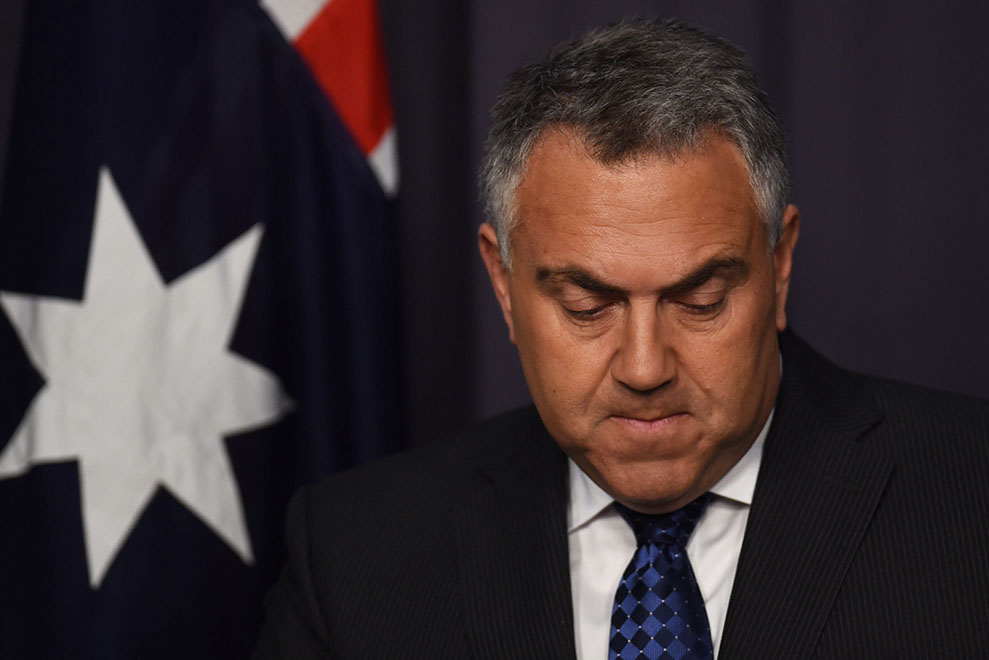A great amount of ink has been expended on the subject of the narrow, short-term focus of contemporary Australian policy-making. We know that voters have become difficult to please, choosing to deny majorities to either major party grouping. But what are the costs when politics and policy get stuck on a populist sushi train? And do these tendencies account for the self-destructive political tactics that seem to plague recent administrations?
The G20 summit in Brisbane was a wake-up call. Like a laboratory experiment in which creatures are suddenly brought out of the dark into bright sunlight, prime minister Tony Abbott found himself unguided and perhaps unguarded in a room of peers, betrayed by a script that was parochial and breathtakingly irrelevant.
We already knew that Australia had hosed down proposals for the G20 to discuss climate policy. Whether that worked or not, it didn’t stop the leaders of our two biggest trading partners – the United States and China – from announcing a new commitment to reducing carbon emissions. And Australia’s approach might have provoked Barack Obama’s address to Brisbane students on the subject – a speech in which he made specific reference to climate impacts in Australia. In the aftermath, a series of leaders visiting Australia made quite clear their distance from both the policy and the tone of Australian political thinking. Key themes promoted dogmatically by the Australian government were pressed against a global context and found to be threadbare.
Less widely observed was the fiscal unravelling that has occurred since the Coalition was elected to government. The first Coalition budget was cast as a solution to a fiscal crisis caused by the previous Labor government, but the cast failed to set. Initially, an apparent lack of fairness undid the sales pitch; then the government’s hamfisted management of parliament saw various measures undone or stuck. Lately, a number of key policy “barnacles” appear to have been subject to the PM’s careening of the ship of state.
Yet it seems the government was somehow unaware that the budget had come undone. At least that is the way it has chosen to play the politics. Treasurer Joe Hockey is only now acknowledging that high commodity prices, which gave Australians such a good ride, are on the wane. Profits will fall. Tax revenues will plummet. Budgets will be constrained, as will the ability of governments to cut easily without risking confidence and discouraging investment.
Governments of all persuasions have failed to prepare the electorate for change. Now that change is upon us. But the greater failure may be in political tendencies that asserted Australian exceptionalism. The idea that we are immune to global influences is an extremely risky one, especially when the global risks are rising.
In his book The Shifts and the Shocks, Financial Times columnist Martin Wolf documents the “consensus view” of the global financial crisis, which has two tenets: that imbalances between national economies are now a persistent driver of instability and, related, that these imbalances produced the crisis and will probably produce others. One country’s trading surplus is another’s deficit, and these have been too skewed too much for too long.
Australia’s ride through the global financial crisis was essentially underwritten by Chinese demand for commodities. The balance sheets of banks and public finance certainly helped to avert any panicky talk, and government priming papered over any cracks, but the ability of the Chinese authorities to keep pumping up their own economic tyres was fundamental to our level of comfort.
Now we see commodity prices tapering. The Australian dollar is weakening, heading for what could be a 20 per cent–plus devaluation, presaging a big adjustment in the economy. This is a very risky period, for reasons that have been apparent for some time.
In many ways, relief from high exchange rates is a good thing. They have a damaging effect on domestic industry and employment for everyone but importers. Farmers and other domestic exporters are more competitive at lower exchange rates, though in some cases that benefit is hedged by the almost universal effect of global supply chains in manufactured goods.
On the other hand, decades of good times and high levels of investment in new resources projects have left a debt burden equivalent to more than half of Australia’s GDP. As it happens, the International Monetary Fund has published research showing how countries that suffer crises due to a loss of confidence in their currency have common diagnostic indicators. When net foreign liabilities exceed 50 per cent of GDP, the risk of crisis increases sharply. Objectively, we should be focused on this risk, since a currency crisis has deep and wide impacts and typically requires a very long recovery, almost never to the pre-crisis economic levels and trends.
Yet our public policy debate generally ignores this risk. Possibly that’s because we have a long history of good performance. More likely it’s because it isn’t on any political score card.
As Wolf observes in his book, ideologues have dominated economic thinking to the point where even hard-nosed economists like US Federal Reserve chairman Alan Greenspan were blindsided by the lack of rigour in capital markets that triggered the financial storm. A by-product of thinking that assumes private sector markets are self-correcting is the obsessive denial of any role for public finance, even in times when it is the essential economic stabiliser. Australian policy remains stuck in blinkers, averting its eyes from the shape of our private sector and the implications of a new array of global risks.
There are many good reasons to assume stormy economic weather lies ahead. Australia’s economic structures have been shaped by robust international growth, and it’s now quite likely that global growth will be slower. Australia’s debt has been built up in a period of very favourable terms of trade and a robust currency; both are waning. We avoided the worst of the global financial crisis, but the external factors that helped most are no longer present. On top of that, we have taken the risky stance of ignoring the growing likelihood of mandated carbon emissions reductions, the penalties for which might come as an untimely disruption to an already weakened economy.
We need to discourage rhetorical debate about fiscal “balance” and revive a focus on the fitness of the economy for the opportunities and threats that lie ahead. That would certainly require an objective reassessment of what our public budgets should look like, but it would also mean opening a discussion about the condition of the private sector. There, government policy appears to advantage primary producers and parts of the finance sector yet does nothing much to foster the higher-value secondary and tertiary sectors that ought to be essential to living standards in a country as wealthy as Australia. A stark lesson of how that imbalance risks Australian stability was on show in Hockey’s MYEFO lament, where he paraded the fall in commodity prices and revealed Treasury’s forecasts with very little confidence and a mordant tone. •




